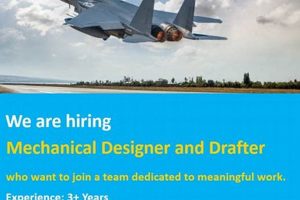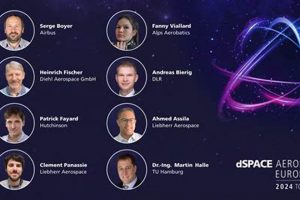Employment opportunities within the aviation and space sector located in the Republic of Singapore represent a significant component of the nation’s economy. These roles span a wide array of specializations, including engineering, manufacturing, maintenance, repair, and overhaul (MRO), research and development, and management. For instance, an aerospace engineer might design aircraft components, while a technician could specialize in maintaining aircraft engines.
The significance of these professional positions stems from their contribution to technological advancement, economic growth, and the maintenance of a vital transportation infrastructure. Historically, Singapore has strategically invested in developing its aerospace industry, positioning itself as a regional hub for aviation-related activities. This investment has created a demand for skilled professionals and fostered innovation in the sector.
The following sections will explore the specific categories of roles available, the skills and qualifications sought by employers, the prominent companies operating in the region, and the future outlook for these careers within Singapore’s dynamic economic landscape.
Individuals pursuing careers in this sector should strategically plan their education, skill development, and job search activities to maximize their prospects.
Tip 1: Acquire Relevant Education: Possessing a degree in aerospace engineering, mechanical engineering, electrical engineering, or a related field is often a prerequisite for many technical positions. Certifications and specialized training programs in areas such as aircraft maintenance are also valuable.
Tip 2: Develop Technical Skills: Proficiency in areas such as CAD/CAM software, computational fluid dynamics (CFD), finite element analysis (FEA), and programming languages is highly desirable. Familiarity with aircraft systems and maintenance procedures is equally important.
Tip 3: Gain Practical Experience: Internships, co-op programs, and entry-level positions offer invaluable hands-on experience. Actively seek opportunities to work on real-world projects and contribute to aerospace-related initiatives.
Tip 4: Network Strategically: Attend industry conferences, join professional organizations, and connect with individuals working in the field. Networking can provide insights into job openings and career paths.
Tip 5: Tailor Resumes and Cover Letters: Customize application materials to align with the specific requirements of each position. Highlight relevant skills, experience, and accomplishments, emphasizing contributions to past projects.
Tip 6: Prepare for Technical Interviews: Technical interviews often involve problem-solving exercises, system design questions, and discussions about specific aerospace concepts. Thorough preparation and a clear understanding of fundamental principles are crucial.
Tip 7: Stay Informed About Industry Trends: The aerospace industry is constantly evolving. Staying abreast of the latest technological advancements, regulatory changes, and market trends is essential for career progression.
By adhering to these guidelines, individuals can enhance their competitiveness and increase their chances of securing employment within this demanding yet rewarding field.
The subsequent sections will delve into specific company profiles and long-term growth trends, offering a more detailed perspective on career trajectories and opportunities for advancement.
1. Engineering Positions
Engineering positions are fundamental to the aerospace sector within Singapore, driving innovation, ensuring safety, and contributing to the industry’s overall competitiveness. These roles encompass a broad spectrum of specializations and are critical to the design, development, and maintenance of aircraft and related systems.
- Aerospace Design Engineer
Aerospace Design Engineers are responsible for creating and refining the structural components and systems of aircraft. This involves utilizing advanced computer-aided design (CAD) software, conducting stress analyses, and adhering to stringent regulatory requirements. For instance, these engineers might design a new wing structure for improved fuel efficiency or develop a lighter, more durable fuselage. Their work directly impacts the performance, safety, and operational costs of aircraft within Singapore’s aviation landscape.
- Avionics Engineer
Avionics Engineers specialize in the electronic systems of aircraft, including navigation, communication, and flight control systems. They design, test, and maintain these critical components, ensuring their reliability and accuracy. An example would be the development of a next-generation flight management system that enhances situational awareness for pilots or the integration of advanced sensors for improved weather detection. These contributions are vital for safe and efficient air travel within Singapore and internationally.
- Propulsion Engineer
Propulsion Engineers focus on the design, development, and maintenance of aircraft engines and propulsion systems. They work to improve engine performance, reduce emissions, and enhance fuel efficiency. This could involve designing new turbine blades for improved airflow or developing advanced combustion systems that minimize pollutants. Their work is essential for maintaining the competitiveness and environmental sustainability of Singapore’s aerospace industry.
- Materials Engineer
Materials Engineers are responsible for selecting and testing materials used in the construction of aircraft. They ensure that these materials meet stringent strength, weight, and durability requirements. For example, they might evaluate the suitability of new composite materials for use in aircraft wings or develop improved corrosion-resistant coatings for engine components. These engineers play a critical role in ensuring the structural integrity and longevity of aircraft operating in Singapore’s climate.
In conclusion, engineering roles are central to sustaining and advancing the aerospace sector in Singapore. From designing innovative aircraft components to ensuring the reliability of critical systems, these professionals contribute significantly to the safety, efficiency, and competitiveness of the industry. The demand for skilled engineers continues to grow as Singapore strives to maintain its position as a leading aviation hub.
2. Maintenance Opportunities
Maintenance opportunities constitute a substantial segment of the aerospace employment landscape in Singapore. The nation’s strategic location and well-developed infrastructure have fostered a robust maintenance, repair, and overhaul (MRO) sector. This sector is a primary driver for the demand of skilled technicians, engineers, and support personnel, contributing significantly to the overall volume of aerospace jobs within Singapore.
The presence of major aircraft manufacturers and airlines in Singapore necessitates a skilled workforce capable of performing routine maintenance, complex repairs, and comprehensive overhauls. These activities ensure aircraft safety, operational efficiency, and regulatory compliance. For instance, a growing number of aircraft maintenance training schools have emerged in tandem to fulfil the demand for maintenance personnel. Moreover, the continuous expansion of aircraft fleets in the Asia-Pacific region further amplifies the need for these specialized services and consequently, the employment prospects in this area. Singapore’s MRO businesses generate economic value by attracting regional and international customers requiring skilled maintenance services.
In summary, maintenance opportunities are a foundational pillar of aerospace employment in Singapore. These positions are driven by the country’s prominent role in MRO activities, the stringent requirements for aircraft safety and regulatory adherence, and the sustained growth of the aviation industry in the region. The ongoing investment in technical training and infrastructure underscores the sustained importance of these opportunities within Singapore’s aerospace sector.
3. Research Roles
Research positions are a critical component of the aerospace sector in Singapore, fueling innovation and enabling long-term growth. These roles directly contribute to advancements in aircraft technology, materials science, and operational efficiency. The presence of strong research capabilities enhances Singapore’s competitiveness in the global aerospace market, attracting investment and fostering high-skilled employment. For example, research into sustainable aviation fuels is actively conducted in Singapore, aligning with international efforts to reduce the environmental impact of air travel. These research initiatives directly translate into new job opportunities for scientists, engineers, and technicians within the aerospace sector.
The link between research roles and the broader scope of aerospace employment in Singapore is characterized by a cycle of innovation and application. Research discoveries lead to the development of new technologies, which in turn create demand for engineers and technicians to implement and maintain these innovations. Furthermore, the commercialization of research findings often results in the establishment of new companies and industries, generating additional employment opportunities. An example is the growth of local companies specializing in the development of advanced sensors and data analytics for aircraft maintenance, stemming from research conducted at Singapore’s universities and research institutions. These enterprises not only employ highly skilled researchers but also create jobs in manufacturing, marketing, and sales.
In conclusion, research positions are not merely isolated functions within the aerospace sector of Singapore but are integral drivers of innovation and economic growth. The emphasis on research and development ensures that Singapore remains at the forefront of aerospace technology, attracting investment, fostering high-skilled employment, and supporting the continued expansion and competitiveness of the sector. While challenges exist in securing funding for research projects and attracting top talent, Singapore’s commitment to innovation underscores the long-term significance of research roles within its aerospace industry.
4. Manufacturing careers
Manufacturing careers represent a crucial component of the broader aerospace sector in Singapore, directly influencing its growth and competitiveness. These roles encompass the fabrication, assembly, and testing of aircraft components, systems, and structures. The presence of a robust manufacturing base is a significant factor in attracting aerospace companies to Singapore, creating a demand for skilled workers in various manufacturing disciplines. For instance, the manufacture of precision engine parts and the assembly of aircraft interiors are activities undertaken by local manufacturers, contributing significantly to overall aerospace employment figures.
The connection between manufacturing careers and the aerospace sector in Singapore is characterized by a reciprocal relationship. The presence of thriving manufacturing capabilities enhances Singapore’s attractiveness as an investment destination for aerospace companies, leading to increased manufacturing activity and thus, more employment opportunities. Conversely, the growth of the aerospace sector fuels demand for skilled manufacturing personnel, creating a positive feedback loop. The emergence of specialized manufacturing clusters focusing on areas such as composite materials and precision engineering exemplifies this dynamic. Such clusters offer specialized training and career pathways within the manufacturing domain, directly supporting the needs of the aerospace industry.
In summary, manufacturing careers are integral to the vitality of the aerospace sector in Singapore. The skills and expertise of manufacturing professionals contribute directly to the quality and competitiveness of aircraft components and systems produced in Singapore. While the sector faces challenges related to automation and skills upgrading, the continued investment in advanced manufacturing technologies and training programs underscores the sustained importance of manufacturing roles within Singapore’s aerospace industry.
5. Regulatory Compliance
Stringent regulatory oversight is paramount to maintaining safety and operational standards within the aerospace industry. In Singapore, adherence to international and national regulations directly influences the nature and scope of roles within the sector. For instance, aircraft maintenance engineers must possess certifications compliant with the Civil Aviation Authority of Singapore (CAAS) requirements. This necessitates specific training and ongoing professional development, shaping career paths and skill sets demanded in the industry. Furthermore, organizations require dedicated compliance officers and legal experts to navigate the complex landscape of airworthiness directives, safety management systems, and environmental regulations. The result is the creation of distinct employment roles focused on ensuring that aerospace operations meet required benchmarks. Failing to comply with regulations can lead to severe penalties, impacting both the viability of aerospace businesses and the security of flight operations.
The emphasis on regulatory compliance extends beyond technical roles. Management personnel are tasked with implementing and enforcing compliance programs, while quality assurance teams monitor adherence to standards across all facets of aerospace activities. For example, any modifications or repairs carried out on an aircraft must be documented meticulously and approved by certified inspectors, as per CAAS guidelines. This rigorous documentation process necessitates employing trained personnel capable of maintaining detailed records and demonstrating compliance through audits and inspections. The increasing complexity of aircraft technology and the evolution of international aviation regulations further drive the demand for specialized compliance expertise, thus creating new opportunities within the aerospace sector.
In summary, regulatory compliance is not merely an external constraint but an integral driver of “aerospace jobs in singapore”. It shapes skills requirements, defines specific job functions, and fosters a culture of safety and operational excellence. While the complexity of regulatory frameworks poses ongoing challenges, the commitment to compliance safeguards Singapore’s reputation as a reliable aviation hub and contributes to the sustainability and growth of its aerospace industry. The ability to navigate and adhere to these regulations is therefore a critical factor in securing and maintaining employment in this dynamic sector.
6. Economic impact
The economic impact generated by the aerospace industry in Singapore is substantial, directly correlating with the availability and quality of “aerospace jobs in singapore”. These jobs form the bedrock of a sector that contributes significantly to the nation’s gross domestic product, technological advancement, and international competitiveness.
- Contribution to GDP and Export Revenue
The aerospace industry accounts for a notable percentage of Singapore’s GDP and export revenue. These figures are directly influenced by the skilled workforce engaged in design, manufacturing, maintenance, and research activities. For instance, revenue generated from aircraft maintenance and repair services contributes substantially to the country’s export income. The presence of specialized “aerospace jobs in singapore” enables the sector to maintain its competitive edge and attract international business, further bolstering the nation’s economic performance.
- Attraction of Foreign Direct Investment (FDI)
The availability of skilled “aerospace jobs in singapore” serves as a strong magnet for foreign direct investment (FDI). Companies are more inclined to establish or expand operations in Singapore when they can readily access a pool of qualified engineers, technicians, and managers. FDI, in turn, generates additional economic activity, creating further employment opportunities and driving technological innovation. The growth of MRO facilities and the establishment of aerospace manufacturing plants are testament to the role that a skilled workforce plays in attracting foreign investment.
- Stimulation of Technological Innovation and R&D
The presence of high-skilled “aerospace jobs in singapore” fosters a culture of technological innovation and research and development (R&D). Engineers, scientists, and researchers engaged in these roles contribute to advancements in areas such as aircraft design, materials science, and aviation safety. These innovations enhance the competitiveness of Singapore’s aerospace industry and create new economic opportunities. For example, government-funded research grants support collaborative projects between universities and aerospace companies, further stimulating innovation and creating high-value jobs.
- Creation of High-Value Employment Opportunities
The aerospace industry provides high-value employment opportunities across a range of skill levels. These positions typically offer competitive salaries and benefits, contributing to the overall prosperity of the workforce. Furthermore, the industry provides pathways for career advancement and professional development, enabling individuals to acquire new skills and progress to higher-level positions. The multiplier effect of these jobs extends to other sectors of the economy, as aerospace employees spend their income on goods and services, further stimulating economic activity.
In conclusion, the economic impact of the aerospace sector in Singapore is inextricably linked to the availability and quality of “aerospace jobs in singapore”. These jobs not only contribute directly to GDP and export revenue but also attract foreign investment, stimulate technological innovation, and create high-value employment opportunities. Continued investment in education, training, and research is essential for sustaining the sector’s economic contribution and ensuring its long-term competitiveness. Furthermore, Singapore’s continued success as a global aerospace hub depends on its ability to attract and retain skilled professionals capable of driving innovation and meeting the evolving needs of the industry.
Frequently Asked Questions Regarding Aerospace Careers in Singapore
The following section addresses common inquiries related to pursuing professional opportunities within the aviation and space sector located in Singapore. It aims to provide clarity and inform individuals interested in entering or advancing within this industry.
Question 1: What are the primary sectors within the aerospace industry in Singapore that offer employment opportunities?
The key sectors include aircraft maintenance, repair, and overhaul (MRO), manufacturing of aircraft components, aerospace engineering and design, research and development, and air transportation services.
Question 2: What qualifications are typically required for engineering positions within the aerospace industry in Singapore?
A bachelor’s or master’s degree in aerospace engineering, mechanical engineering, or a related field is generally required. Specific roles may also necessitate specialized certifications or experience with relevant software and technologies.
Question 3: What is the typical salary range for entry-level aerospace engineers in Singapore?
The salary range for entry-level aerospace engineers can vary depending on the specific role, company, and candidate’s qualifications. However, the range typically falls between SGD 4,000 to SGD 6,000 per month.
Question 4: Are there specific skills that are highly sought after by aerospace employers in Singapore?
Skills such as proficiency in CAD/CAM software, knowledge of aircraft systems, experience with composite materials, and understanding of aviation regulations are highly valued.
Question 5: What are the prospects for career advancement within the aerospace industry in Singapore?
Career advancement opportunities are plentiful for individuals with strong technical skills, leadership qualities, and a commitment to continuous learning. Progression can lead to roles such as project manager, senior engineer, or technical specialist.
Question 6: What is the role of government agencies in supporting the aerospace industry and “aerospace jobs in singapore”?
Government agencies such as the Economic Development Board (EDB) and the Civil Aviation Authority of Singapore (CAAS) play a crucial role in promoting the growth of the aerospace industry through investments in infrastructure, support for research and development, and the implementation of favorable policies.
In summary, the aerospace sector in Singapore presents a dynamic landscape of career options. Success in this field depends on relevant education, specialized skills, and a commitment to continuous professional development. Government initiatives further strengthen the industry and enhance employment prospects.
The subsequent section will examine the future outlook for aerospace and the importance of STEM in “aerospace jobs in singapore”.
Aerospace Jobs in Singapore
This exploration has illuminated the multifaceted nature of career options within the aviation and space sector in the Republic. The analysis has spanned various dimensions, encompassing engineering, maintenance, research, manufacturing, regulatory compliance, and overall economic impact. Key findings emphasize the need for specialized education, technical proficiency, and adherence to stringent industry standards.
Looking forward, the sustained investment in technological innovation, infrastructure development, and workforce training will determine the trajectory of “aerospace jobs in singapore”. Continued emphasis on STEM education and the cultivation of high-value skills will be essential to maintain competitiveness in the global aerospace landscape. Prospective professionals and stakeholders are encouraged to remain informed about evolving industry trends and to actively contribute to the sustained growth and advancement of the sector.







